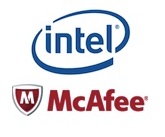Joint Innovations from Intel and McAfee Help Address Cloud Security Challenges
When Intel made its $7.68 billion acquisition of McAfee in early 2011, the chip giant promised that the merger would lead to stronger security controls and advanced levels of protection across various technologies. Yet, aside from a few announcements since that time, Intel had not fully explained how McAfee would fit into the bigger picture. That changed on Friday, when Intel announced its latest cloud-based security initiatives, which rely heavily on McAfee.
By 2015, Intel expects that more than 3 billion connected users and 15 billion connected devices will be driving more than 1,500 exabytes of cloud traffic. Technology is able to keep pace with this growth, but security remains an issue, the company said.
 One of the issues identified by Intel centered on the “reduced control of and visibility into the infrastructure security capabilities” that some organizations face when operating within the cloud. These challenges are amplified, Intel added, when using off-premise public cloud infrastructure that is often managed by third parties. Moreover, performing audits across private and public cloud data centers is complex, making it difficult to meet specific compliance requirements, thus lowering confidence in security.
One of the issues identified by Intel centered on the “reduced control of and visibility into the infrastructure security capabilities” that some organizations face when operating within the cloud. These challenges are amplified, Intel added, when using off-premise public cloud infrastructure that is often managed by third parties. Moreover, performing audits across private and public cloud data centers is complex, making it difficult to meet specific compliance requirements, thus lowering confidence in security.
To address these issues, Intel will leverage McAfee’s ePolicy Orchestrator (ePO), which offers policy management across physical, virtual and cloud environments. The plan is to integrate ePO with hardware-based protections, such as Intel Trusted Execution Technology (Intel TXT).
Intel TXT is a hardware security offering that validates the integrity of components within an Intel-based server at startup. Currently, Intel TXT is available within the E5 family of Xeon processors.
The Intel TXT checks and policy management can be combined with McAfee’s MOVE AV (Management for Optimized Virtual Environments AntiVirus), which offers the expected protection, but with performance and resource utilization improvements that benefit virtual desktops and servers. There’s also the usage of McAfee’s Application Control software, which ensures that only authorized code runs within an environment.
These offerings are just the tip of the iceberg for Intel, tech titan also plans to leverage McAfee’s CSP (Cloud Security Platform) in order to work on addressing security between the datacenter and mobile devices. Moreover, the Intel/McAfee created Deep Defender will also have a role to play.
Deep Defender provides hardware security that uses Intel Virtualization Technology (Intel VT) built into the i3, i5 and i7 processors to detect and delete low-level threats that are difficult to detect with traditional operating system (OS)-based security techniques in real-time.
Intel’s plans for McAfee and the larger landscape of enterprise security and technological growth are sure to be a welcome addition at the table, but many organizations are likely to take a wait-and-see approach before relying on a single vendor for a majority of their protection.












